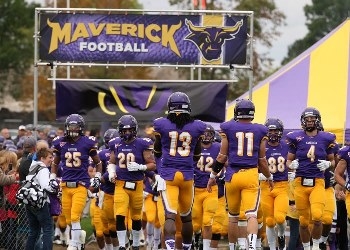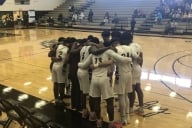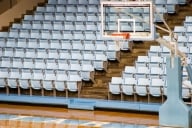You have /5 articles left.
Sign up for a free account or log in.

Minnesota State University at Mankato
The college sports establishment is being assaulted on multiple and fragile fronts, with legal battles over safety and concussions, scholarship caps and the right of athletes to profit off their image, and now, the Northwestern University football unionization.
While all those issues are months or even years from resolution, the public, media and political scrutiny they’ve drawn continues to peak. And it may be emboldening athletes to make demands in ways that at one time may have seemed unthinkable.
The latest protest wasn’t over athletes’ playing – or, if the regional National Labor Relations Board decision holds up, working – conditions. Rather, it was over the reinstatement of a head football coach who in 2012 was charged with possession of child pornography, arrested, suspended, and eventually fired from Minnesota State University at Mankato.
A judge eventually cleared Todd Hoffner of the charges, saying that the photos of naked children on his work cell phone innocently showed his kids playing in the bathtub.
This month, an arbitrator ruled that the coach had been unfairly fired and should be allowed to return to Mankato. Hoffner, who had since moved on to coaching at Minot State University, elected to go back to Mankato, but met with unexpected resistance.
At practice Wednesday, the team showed up in Maverick Football hoodies to announce they wouldn’t practice and read from a prepared statement, the student MSU Reporter wrote.
“We’ve all become outstanding community members, students and athletes in the last year and a half since the removal of Todd Hoffner. Throughout this process, we have been silent, it is time our voice is heard,” the junior safety Sam Thompson said. “We want information, we want answers, because this is our team…. We want Aaron Keen as the head coach.”
Keen, the assistant who took over when Hoffner left, had led the team to a 24-2 record and two Division II playoffs in two seasons and clearly earned the respect of his team. In protesting, the athletes said, they aimed to declare their support for Keen, and open up better lines of communication between the players, administration and coaching staff "about the coaching situation."
The players ended their boycott a day after it began, saying at a news conference Thursday that they had gotten those answers and while they “stand behind” their actions, they did not want to “undermine coach Hoffner’s return.” They resume practice today, with Hoffner in charge.
Even if the full NRLB denies Northwestern’s appeal and agrees that Northwestern football players on full scholarship should be allowed to unionize, that decision would apply only to private institutions in Divisions I and II. And the Northwestern unionizers have said that at this point, they’re only interested in fighting for improved safety, medical insurance and due process rules.
But the situations at Mankato and other campuses indicate that athletes may be more willing to stand up for themselves, either through a boycott or, eventually, at the collective bargaining table. It’s not like the Mankato athletes can just transfer – not if they want to immediately play again, at least; NCAA rules prohibit that. Although players often enroll at a given institution because in part or because they like the coach, if said coach up and leaves, the athletes must either live with it or transfer and lose a year of eligibility.
“ ‘Conditions of employment’ is a fluid concept,” said D. Moschos, a senior partner in Mirick O’Connell’s Labor, Employment and Employee Benefits Group. If athletes unionize, the subjects they’ll bargain for may be different from, say, those of auto workers, because their employment conditions are different. “The legal issue is to be decided, but I would suspect that the student union would want to be involved in more than just [money and academic support].”
Oftentimes, a college will opt to appease or compromise with disgruntled players and avoid dragging out a fight. That’s what happened last fall at Grambling State University, where football players refused to practice or play until administrators improved the condition of their worn-down facilities and equipment, after a local CEO said he’d donate money toward the cause.
“They knew that the larger public pressures would eventually prevail in this case, and eventually they got what they needed,” said Eddie Comeaux, an assistant professor of higher education at the University of California at Riverside who studies athletics. “I see sensible requests, reasonable requests, as something that when it sways public opinion, can get institutions to provide necessities.”
After Northwestern athletes learned they would vote on whether to join a union, university athletics staff revealed an option to wear new impact-reducing Riddell SpeedFlex helmets, though officials said that had nothing to do with the NLRB decision.
Comeaux likened the Mankato situation to one in the early 1990s at the University of California at Berkeley, when a men’s basketball team full of star players was able to get head coach Lou Campanelli dismissed. The players had complained about Campanelli's abrasive coaching style.
Other players don’t – or can’t – speak up, and the university waits to act until things get totally out of hand (case in point, Rutgers University’s Mike Rice). But either way, it might have been difficult for the Mankato athletes to get what they want at this point if there’s no evidence that the relationship between Hoffner and his players is actually damaging, said Galen Clavio, an assistant professor of sport management at Indiana University at Bloomington.
“If you look at the way a lot of labor situations occur in the other sectors of the economy, I think there’s a distinction drawn there, of not like a person versus thinking that they put you in jeopardy,” Clavio said. “I don’t see why it would be a stretch to assume that union athletes would be able to bring that sort of thing to the table and say, ‘This is not an acceptable environment to work in.’ ”








